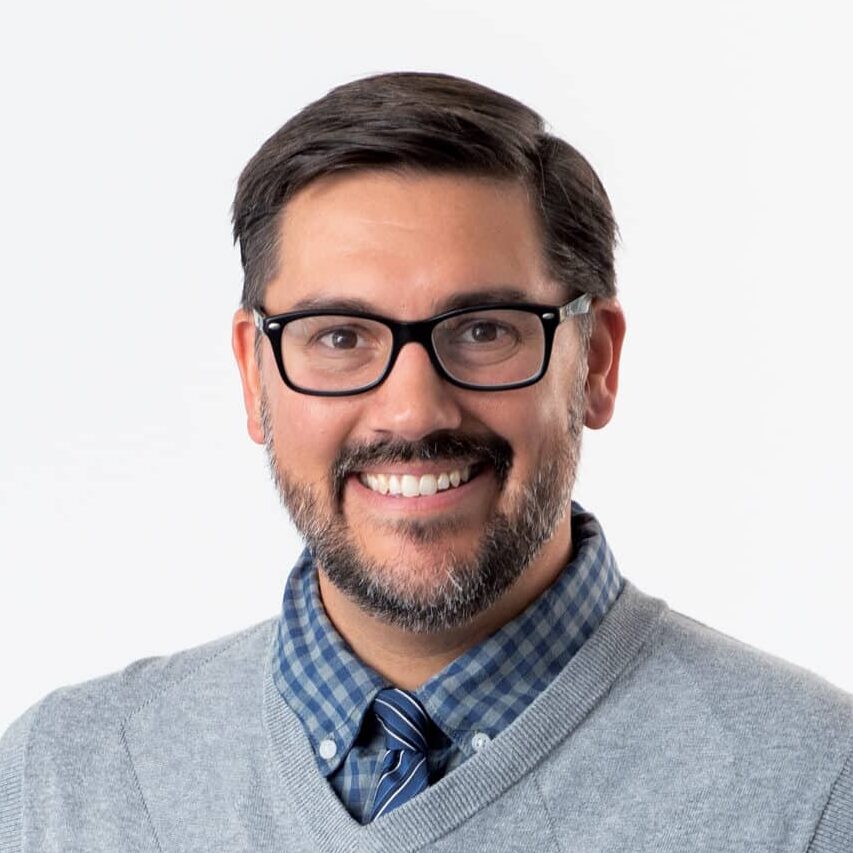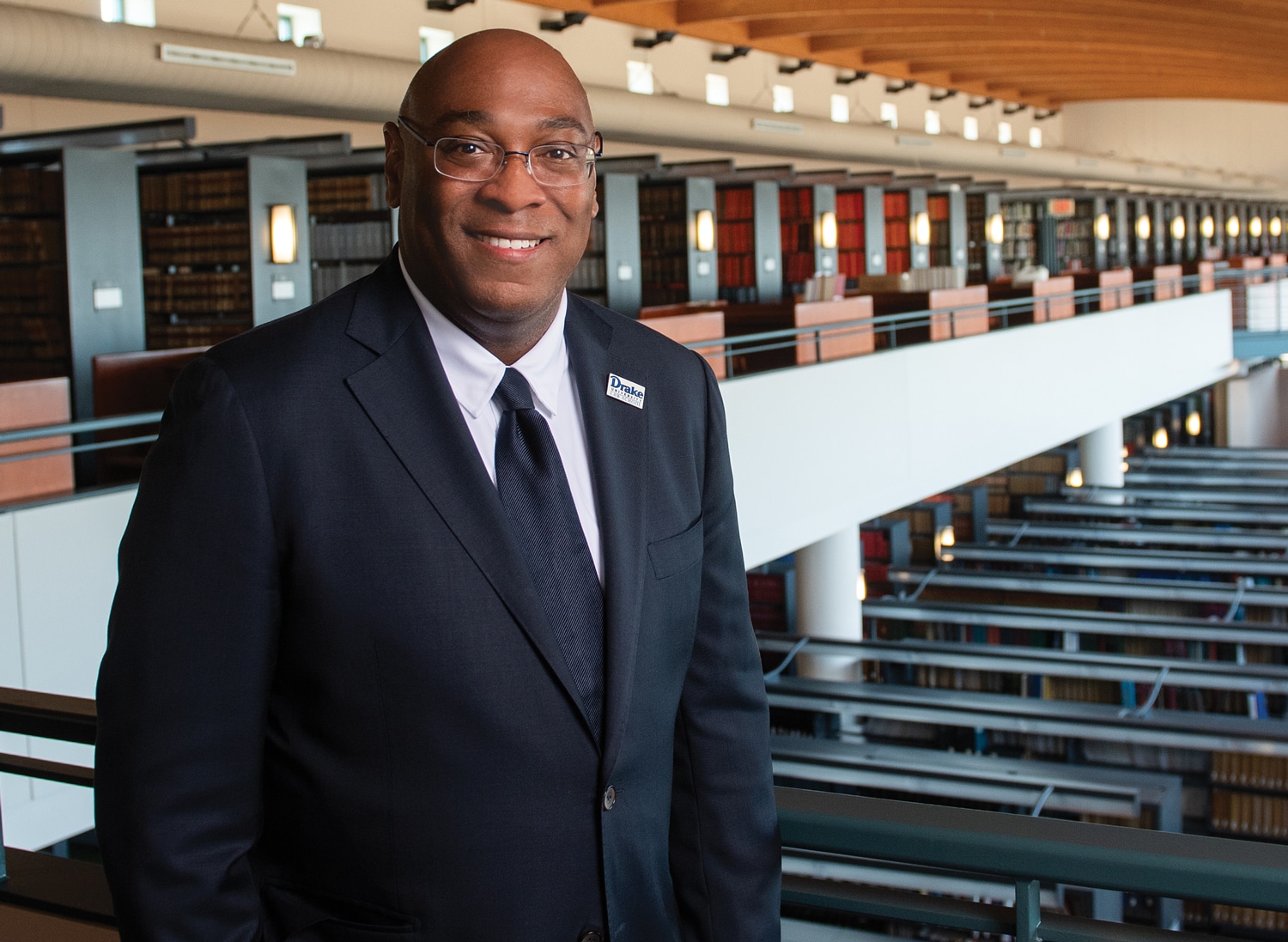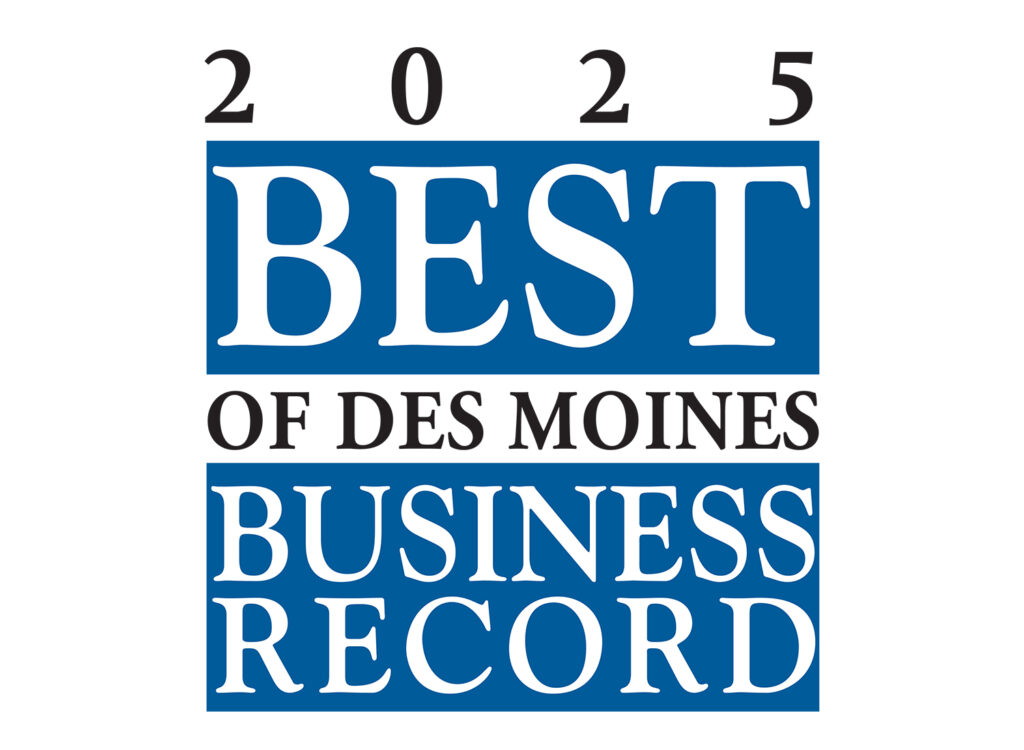A Closer Look: Roscoe Jones Jr., Dean designate, Drake Law School

Mike Mendenhall Jun 7, 2024 | 6:00 am
12 min read time
2,862 wordsAll Latest News, Business Record Insider, Education, Government Policy and Law, HR and LeadershipRoscoe Jones Jr. will soon join a historically significant group of recently appointed law school leaders around the U.S. on July 1 when he officially becomes Drake Law School’s 22nd dean.
The 46-year-old public policy attorney, originally from Meridian, Miss., will be the first Black dean of the Drake Law School, founded in 1865, and Drake University’s first Black dean of any college or school.
Jones points to the University of Southern California in March naming Franita Tolson dean and Carl Mason Franklin Chair in Law of the USC Gould School of Law, and Loyola University Chicago School of Law appointing Michèle Alexandre in 2022 as examples of how leadership in legal education is beginning to experience some change.
“I think this sends a message about the trajectory that the doors are opening,” Jones told the Business Record on April 4. “And the most important thing is once you open that door, make sure others can follow.”
Jones comes to Drake as a partner with Gibson, Dunn & Crutcher’s Washington, D.C., office, where he also co-chairs the firm’s public policy group.
Jones said after graduating in 2003 from the University of Virginia School of Law, where he was editor-in-chief of the Journal of Social Policy & the Law and co-founder of the Center for the Study of Race and Law, he “turned down the big money from the firms” to clerk for two federal judges.
He spent five years at the U.S. Department of Justice working as an assistant U.S. attorney in the Western District of Washington, an appellate attorney in the Civil Rights Division and special counsel to then-Assistant Attorney General for Civil Rights Tom Perez, according to a news release at the time of his hire.
Jones also worked for nearly a decade on Capitol Hill, including as chief of staff to U.S. Rep. Abigail Spanberger; legislative director to then-U.S. Sen. Dianne Feinstein; senior counsel to U.S. Sen. Cory Booker; and senior counsel on the U.S. Senate Judiciary Committee for then-Chairman Patrick Leahy.
Jones said there are attributes to being what he called a nontraditional dean, someone who has spent more time as a legal practitioner than leading a classroom.
But Jones has “had one foot in academia” for the last 10 years, teaching as an adjunct and guest lecturer at the Harvard Kennedy School of Government, as well as in law schools at Yale, Chicago, Georgetown and Michigan.
“But throughout all of these experiences, I’ve always felt a push to do more work in higher education to give back,” he said. “I think to whom much is given, much is expected, and we all owe something to that next generation.”
Jones’ urge to lead Drake Law School and for public service starts with his parents. His mother, Connie Jones, was a public school educator, and his father, Roscoe Jones Sr., was a Marine Corps veteran and civil rights activist.
Although he’s a native Southerner, Jones Jr. said his wife, Serena Holthe, is from Logan, Iowa, which made coming to Drake a bit of a homecoming for their family.
“And I should also mention that my wife is the better lawyer in the family,” he said. Holthe works at the Children’s Defense Fund in Washington, D.C., and is a former public defender in Baltimore City.
Jones spoke with the Business Record on April 5 at the Drake Law Library days after arriving in Des Moines from Washington, D.C. He spoke about his vision for Drake’s legal program, his reverence for those who came before him, and the weight and meaning of his hire for the university and the Des Moines community.
The Q&A was edited and condensed for clarity and brevity:
You said you’re a Southerner. Where are you originally from?
I’ve been in Washington, D.C., for almost 20 years. But actually, my story starts in Meridian, Miss., where I was born. I was raised in Houston, Texas. My father, who was a [U.S.] Marine Corps officer, also served his country in Vietnam, but before that, he was doing service even when his country turned his back on him, growing up in the Jim Crow South in Mississippi. He marched at Bloody Sunday in Selma, Ala. He was part of Freedom Summer in 1964. He was part of the Freedom Democratic Party that unseated the all-white Democratic Party in the ’64 convention.
So I grew up with a family that talked about doing things bigger than yourself, making an impact. Now I measure success by the impact that I’m having. My mom was a lifelong educator. So that kind of shows you why I’m here. She is a guidance counselor and an assistant principal, and then she hired teachers later in her career. Understanding the importance of education, I’ve always believed that education is transformative because it transforms individuals. It gives you access to that American dream, and it transforms communities as well.
Does being one of the youngest deans give you the time to affect the legal community and to implement the strategies and philosophies that you think are important?
You’re absolutely right. I think you have a sense of proximity, a sense of being kind of close in time to our students. Look, I’m 20 years out. But there are things I think that I’ve experienced, especially with continuing to teach, of understanding how the new generation is thinking about things and being a little bit more innovative. The legal profession, we’re not always known as being innovators, right? But I hope that maybe our youthful movement can be a little bit different in terms of being more innovative there. I also think that you’re right that you also have the benefit of time, the benefit to be here to make an impact. Success is measured not just by numbers and metrics. Those are important; of course they are. But what’s more important is what impact are we making on our students’ lives. What impact are we making on our faculty to get their ideas disseminated to the larger public? What impact are we making to the larger university working in close collaboration with other schools, like the business school or the journalism school? What impact are we making in the broader community to our alumni? I like to say that you give us three years, we give you the rest of your life.
Who is one of the biggest inspirations or influencers in your life, whether personal or professional?
Oh gosh. First of all, it starts with my parents. I think my dedication to service, doing something bigger than myself. People ask, “Well, why do you want to go from a law firm to leading a law school?” I had a mom who was an educator. And so the importance of education was rooted in me from the very beginning. I think there’s no greater service. Of all the things that I’ve done, there is no greater service than to train the next generation of lawyers and leaders. And that, to me, is critically important. I also was very much inspired when I went to law school … by Thurgood Marshall and Charles Hamilton Houston. Charles Hamilton Houston trained Thurgood Marshall, and he was the dean of Howard [University School of Law], the first African American graduate of the Harvard Law School. And he started the progeny of cases that led to Brown v. Board of Education.
We all know Thurgood Marshall. Many of us don’t know Charles Hamilton Houston. But in the book “Simple Justice: [The History of Brown v. Board of Education and Black America’s Struggle for Equality” by Richard Kluger] it’s a great story about the lawyers at the NAACP Legal Defense Fund, and the work that they did to really make America live up to its promises.
And I’ve always believed, Charles Hamilton Houston had a quote that said lawyers are “either social engineers or parasites on society.” I don’t know if that’s totally true. But I think that his point of the commitment to something bigger than yourself, the ability of lawyers to be influential in not just implementing the law but changing the law. Many of us ended up being judges or being in a legislature. Here at Drake Law School, we have a legislative clinic; we are in a capital city. The ability to also imagine what the law could be, not just what it is, is extremely important. Look, I should also mention one of the things that’s so special, and one of the things that influenced me was being a practitioner. Like I said, I did civil rights, I did public policy, but I was inspired by doing the work and coming to a law school like Drake, where we believe in being great in both theory and practice. I think that’s what sets us apart is our dedication to practice. Look, all of our faculty, 100% of our faculty have been practitioners. That is unique. It’s one of the reasons I wanted to be part of this great community. Because the values that I believe in – impact, service, being practicing lawyers – those are things that we’ve believed in for a long time as a law school.
Being the first African American to lead the Drake Law School, can you talk about the weight and importance of the moment for Drake, the city of Des Moines and for you personally?
So much humility, right? As I mentioned before, I believe that there are so many people who have walked these halls before me, people of different backgrounds who have paved the way for me to be where I am. So I understand that I stand on the shoulders of giants. I think whenever you are the first, the most important thing is not to be the last. And so I always think about it, and one of my priorities is obviously going to be thinking about diversity, equity and inclusion. How can we make sure that other people, first-generation students, women, people from all different races and ethnicities and sexual orientations, immigrants, how can [we] make sure that they have access to a legal education, that it’s affordable? First of all, we’re recruiting them, that we’re going out and we want to be a place that is going to be diverse, but we also are going to be a place that’s going to be inclusive. And when people are here, they know they belong. I think the biggest compliment a dean can get, any dean but particularly I feel this as an African American dean, first is for students to say, no matter what their background is, “When I went to Drake, not only did I get a great education but I felt like I belonged.” I think that that’s so important.
How would you describe your leadership style?
Positive, collaborative and innovative. I like people who have ideas, right? I want you to think outside the box, but I will always be supportive of my team. I will not make decisions that others are not included in. I believe in being collaborative. One of the things that’s unique about higher education is a concept of shared governance. It’s something we take very seriously, where our faculty, those are part of my clients, along with our students, they are part of my clients, along with our alums, they are part of my clients. We have to make decisions in a way in which it is collaborative. And that’s the way that you get full implementation, in any context, but especially in the higher education context. And that’s one of the things I want to be known as. I want to be a good partner to my other deans on campus. I want to figure out ways to work with them. I’m going to go to them and say, “Hey, what can we do together?” One of the trends in higher education is interdisciplinary learning. We’ve got to prepare our students for a world not just with legal solutions, but understanding the full humanity. We talked about AI. Maybe there are things we can learn from other schools at the university about AI. We talked about leadership development. Maybe there are things we can learn from the business school, and maybe there are things they can learn from us about how to make students better leaders. So, one of the higher education trends is interdisciplinary learning, and that just means being good partners with each other and working together.
Let’s talk about your vision for Drake Law School.
Again, I just want to say it really clearly … I think the humility part is the most important. I want to be a good learner and good listener. But also there are other things that I want to do. I believe in excellence. We do a lot of great things already in terms of making sure that our students graduate, pass the bar and get employed. I mentioned the numbers. We want to continue that and be even better. I want to make sure as many students as possible both pass the bar and get employed. But I also want to think about student excellence in terms of diversity. I mentioned that excellence and diversity go hand in hand. And so diversity is a key priority. I also want to make sure we’re at the cutting edge. And so things like artificial intelligence are important. Also, leadership development is important, too. All those go toward student success. I also want to make sure that we are a place that is collaborative, and so interdisciplinary learning, working in partnership with other schools to really advance our mission is going to be incredibly important, too. And then I think investment is going to be key. In order for us to go to that next level, we’ve got to grow. We’ve got to grow our faculty. We’ve got staff who are doing a tremendous job for really low pay. And I want to make sure we are market competitive with our faculty, with our staff. I want to make sure that we’re attracting the best and brightest, not just in Iowa and the Midwest, but all over the country. And so brand recognition, getting our brand to go from a regional school to a national school is also part of my vision. … I want to work collaboratively with our faculty, staff, students and alums to come up with our shared vision.
You mentioned working with other schools here on campus to see what you can learn from one another. Is there a recruitment aspect to that, because there are a lot of undergraduates on campus in different disciplines who may be considering law? Would that be part of your vision?
Look, it absolutely could be. The more prominent that we are – and I want to be prominent throughout the state, the Midwest and all over the country – the more that people understand what the law school does and all of our opportunities, I think we become a no-brainer. As I mentioned before, I think we are one of the best kept secrets in all of higher education because we are affordable, but our student success rate is just off the charts. And so the more that we tell that story to students here at Drake, to students throughout Iowa, throughout the Midwest, but also outside of that, right? I want to make sure that if I’m going to North Carolina, people think of Drake Law School and not just Duke Law School, right? I want to make sure that we are getting my name out there. And students are coming to us from all over the country.
What are the challenges of becoming market competitive when it comes to compensation for your faculty? Drake is a private school; it’s a smaller institution.
Look, I think you’ve hit it on some of that. We are a private institution, so we’re not getting as many state funds as a public school would. And so we’ve got to hit the pavement a little bit more. We are very blessed to have a very generous alumni base who has been very loyal to our school. But I think that we also have to expand that. We’ve got to get more alums involved, but we also have to really diversify our income sources. Are there federal funds, for example, we can get access to? Our Constitutional Law Center here on campus has been receiving federal funds. We’re one of the few in the country that can do that. Are there other opportunities to get federal funding for other centers, for example? Are there ways that we can get more law firms and corporations to also understand our mission, the promise of our students and also want to be supportive as well? We’ve got to think about how we can really diversify our funding base as well.
Do you plan to use your connections in Washington, D.C., to try to seek out those funds?
I hope that all of my unique attributes will be of benefit to the law school.

Mike Mendenhall
Mike Mendenhall is associate editor at Business Record. He covers economic development, government policy and law.











